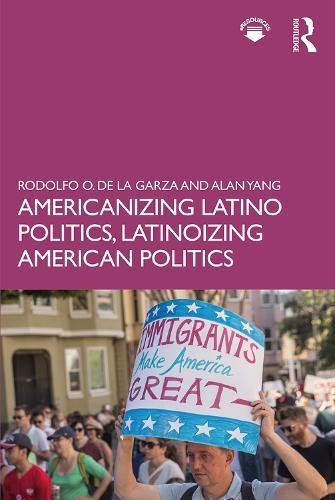Full Product Details
Author: Rodolfo O. de la Garza (Columbia University, USA) ,
Alan Yang
Publisher: Taylor & Francis Ltd
Imprint: Routledge
Weight: 0.660kg
ISBN: 9781138483538
ISBN 10: 1138483532
Pages: 270
Publication Date: 02 December 2019
Audience:
College/higher education
,
Tertiary & Higher Education
,
Undergraduate
Format: Hardback
Publisher's Status: Active
Availability: In Print

This item will be ordered in for you from one of our suppliers. Upon receipt, we will promptly dispatch it out to you. For in store availability, please contact us.
Reviews
This superb empirical mapping of the development and institutionalization of what the authors call political ethnicity has implications well beyond the book's rich account of political dispositions and behavior among Americans with Mexican, Puerto Rican, and Cuban roots. For what it offers is an account of mechanisms that mutually shape experiences, identities, and patterns of political expression. - Ira Katznelson, Columbia University Americanizing Latino Politics, Latinoizing American Politics offers a methodologically rich and institutionally grounded study of Latino political behavior through the period in which survey data can be tapped to understand Latino political attitudes and behaviors. It illustrates the twin-edged process of the increasing cohesion of Latino political attitudes and partisan attachments, regardless of national origin or ancestry, and the increasing Latinoization of U.S. politics. Through this analysis, the authors offer a new, more contemporary model of immigrant/ethnic Americanization that places political identity and political influence at the core of political identity building. - Louis DeSipio, University of California-Irvine Only the most ambitious among us can ask and answer how and why U.S. Latinos have converged politically over time. De la Garza and Yang have accomplished the feat with the highest order of insight, precision, and verve. - Jane Junn, University of Southern California This book demonstrates that the Latino vote is more than just an episodic expression of partisan preferences. In this era of increasing social divisions and political polarization it is refreshing to see evidence that shows that community can be the result of politics. Not a community where singular differences are erased but one where disparate national origins converge in political orientations and behavior that affirm an identity that reinforces both a sense of belonging and a sense of plurality. Here the idea of E Pluribus Unum comes to full life; most importantly, the book shows that this is a historically contingent process. This is one more piece of the puzzle that shows how through politics Latinos contribute dynamically and distinctively to the making of our nation. - Jose E. Cruz, University at Albany, State University of New York De la Garza and Yang provide the most persuasive analysis to date showing that a panethnic Latino public opinion and politics has emerged from Mexican-American, Puerto Rican, Cuban, and other Hispanic groups, once regarded as fully distinct. Updating statistical results beginning with the findings from the 1990 Latino Political Survey (LNPS), that De la Garza pioneered, with a systematic and impressive social scientific analysis of later surveys from 2006 to 2018, the authors show that while some important and interesting group-specific differences remain, the policy preferences and other political opinions of these ethnic groups have substantially converged. De la Garza and Yang make a compelling and provocative case that this unified panethnic political group has emerged as consequence of the process of Americanization - which they define and measure - that Latinos experienced during the last three decades. We will want to see how this identity politics plays out in the 2020 elections and the years ahead. - Robert Y. Shapiro, Columbia University
Only the most ambitious among us can ask and answer how and why U.S. Latinos have converged politically over time. De la Garza and Yang have accomplished the feat with the highest order of insight, precision, and verve. - Jane Junn, University of Southern California This book demonstrates that the Latino vote is more than just an episodic expression of partisan preferences. In this era of increasing social divisions and political polarization it is refreshing to see evidence that shows that community can be the result of politics. Not a community where singular differences are erased but one where disparate national origins converge in political orientations and behavior that affirm an identity that reinforces both a sense of belonging and a sense of plurality. Here the idea of E Pluribus Unum comes to full life; most importantly, the book shows that this is a historically contingent process. This is one more piece of the puzzle that shows how through politics Latinos contribute dynamically and distinctively to the making of our nation. - Jose E. Cruz, University at Albany, State University of New York De la Garza and Yang provide the most persuasive analysis to date showing that a panethnic Latino public opinion and politics has emerged from Mexican-American, Puerto Rican, Cuban, and other Hispanic groups, once regarded as fully distinct. Updating statistical results beginning with the findings from the 1990 Latino Political Survey (LNPS), that De la Garza pioneered, with a systematic and impressive social scientific analysis of later surveys from 2006 to 2018, the authors show that while some important and interesting group-specific differences remain, the policy preferences and other political opinions of these ethnic groups have substantially converged. De la Garza and Yang make a compelling and provocative case that this unified panethnic political group has emerged as consequence of the process of Americanization - which they define and measure - that Latinos experienced during the last three decades. We will want to see how this identity politics plays out in the 2020 elections and the years ahead. - Robert Y. Shapiro, Columbia University
Author Information
Rodolfo O. de la Garza was, until his death, Eaton Professor of Administrative Law and Municipal Science, and Professor of International Public Affairs, at Columbia University. Alan Yang is Senior Lecturer in the Discipline of International and Public Affairs at Columbia University.




